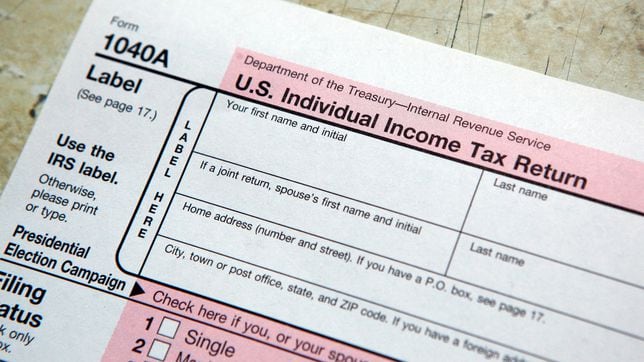2024 Tax Season updates: deadline, extension, tax credits, refund status
Follow along for all you need to know as the 15 April tax filing deadline approaches. Tax credits, refund status, requesting a refund and much more.


Show key events only
US Tax Season 2024: Latest Updates
Headlines: Friday, 12 April, 2024
- Taxes are due on Monday, 15 April, 2024; there is still time to request a free extension
- Taxpayers in twelve states have the option to pilot the IRS Direct File software
- IRS to offer assistance to tax payers at clinics located across the US on Saturday
- Average refund size upcompared to those sent by the IRS in 2023
Helpful links
- What is the difference between tax return ‘accepted’ and ‘approved’?
- Tax Deadline 2024: when is the last day to submit the documentation?
- Are there any tax benefits to beingmarried over being single?
- Tax Season 2024: Do senior citizens on Social Security have to file taxes?
Read more from AS USA:
There are only a few days left in the 2024 tax season. The Internal Revenue Service (IRS) has been receiving and processing the declarations corresponding to the 2023 tax year and taxpayers are running out of time to comply with their obligations.
The deadline to file returns and pay taxes, also known as Tax Day, is April 15. Due to the Patriot Day and Emancipation Day holidays, Maine and Massachusetts residents have until April 17 to do so.
The fastest way to get a tax refund
The old ways are the best? Not when it comes to tax returns. Take advantage of the IRS’ digital submission system to get your refund weeks before paper returns have been processed.
Americans across the nation are filing out their tax forms to submit to the IRS if they haven’t already done so for the 2023 fiscal year. One of the major credits that families with children may be able to take advantage of is the Child Tax Credit, which is worth up to $2,000.
This year, the federal benefit is partially refundable, and to start claiming the portion known as “Additional Child Tax Credit” worth up to $1,600, a specific earnings threshold needs to be met. According to the IRS, a filer cannot have an income greater than $200,000 (or $400,000 for joint filers) to claim the CTC. Read more in our full coverage on the states that have their own CTC.
How to get your refund as soon as possible
If you want to get your tax refund as quickly as possible, you will need to submit your return electronically and provide direct deposit information to the IRS. If both of these steps are taken, a filer can estimate that their refund will be distributed within three weeks. However, as the deadline approaches, the backlog of returns to be processed could push this estimate back. The deadline for submitting your 2023 return is Monday, 15 April (or 17 April in Maine and Massachuests). Extensions are still available and that will push back the filing deadline to 15 October.
Do you know about the Saver's Credit?
The IRS reports that "you may be able to take a tax credit for making eligible contributions to your IRA or employer-sponsored retirement plan." As many filers rush to turn in their 2023 returns, considering their eligibility to claim the credit could help lower their tax bill.
You can claim the credit if you are 18 and older, not claimed as a dependent on another filer's return, and cannot be a student. Find out more at the link below.
There is still time to try direct file
The IRS is reminding tax payers that in twelve states, they have the option to use the IRS' pilot filing software Direct File that will be rolled out nationally next year.
The software is available in the states where no state taxes are levied on income: Florida, Nevada, New Hampshire, South Dakota, Tennessee, Texas, or Wyoming. If you lived in one of these states for all of 2023, you can use the software. Additionally, residents of Arizona, California, Massachusetts, New York, and Washington can also take advantage of the pilot program this year.
How to report gig work to the IRS
This year, the IRS is taking additional steps to ensure that income generated through gig work, particularly on apps like Uber, Lyft, or Esty, are reported on a person's tax return. All of these platforms will be required to send users a 1099-K, which will include the income generated through the platform and that information can be reported on one's tax return. Those with an income from gig work that is less than $600 will not be required to pay tax on those funds. This webpage, set up by the IRS, offers gig workers tips to ensure that they are not missing payments to the IRS, which can lead to penalties and interest being accused on funds that are not paid on time. Gig workers, like the self-employed, are required to pay taxes and report their income to the IRS on a quarterly basis:
- April 15 for payment period January 1–March 31
- June 15 for payment period April 1–May 31
- September 15 for payment period June 1–August 31
- January 15 for payment period September 1–December 31.
Sticking to this calendar will be the most effective way to ensure that you are not incurring penalties.
Tax season is drawing to a close, and to avoid any fees or penalties, a tax return must be submitted to the IRS by Monday, 15 April (or April 17 in Maine and Massachusetts). While an extension can be requested to file the return until October 15, it does not apply to paying taxes, which must be done by the tax deadline. According to a January AP-NORC poll, only 27 percent of taxpayers believe their federal income taxes are fair, while 60% believe their tax burden is too high.
Governor doesn't want Michiganders to miss out on tax breaks
Tax Day is fast approaching. Most Americans must submit their IRS tas filings by Monday 15 April, and many states also require income declarations on the same day.
If you still haven't filed, make sure that you don't miss out on tax breaks available that could save you big bucks and even put some extra cash in your pocket. For those in Michigan, Governor Grethchen Whitmer sends a friendly reminder to see if you qualify for Retirement Tax and the Working Families Tax Credit.

Tax season has arrived, and it's time to organize your papers to make the April deadline. Make sure to take advantage of all available tax benefits.
There is still time to claim stimulus checks
There is still time to claim stimulus checks
The IRS gives taxpayers three years to submit or amend a tax return. That means this is the last year to claim the Economic Impact Payments, more commonly known as stimulus checks sent in March 2020.
The tax credit to claim the checks if they were not sent to you or deposited directly into your bank account was the 2020 Recovery Rebate Credit, and a 2020 return with that credit claimed must be submitted by 17 May 2024. If you are eligible, $1,200 will be tacked onto your refund for that year and will not impact the refund you receive this year for filing your 2023 tax return. For more information... read on in our full coverage.
Congress could make filing taxes much easier
The tax filing process in the US is much more complicated than it needs to be. The IRS has all of the information it needs to file a return on your behalf, but it makes filers jump through hoops and pay for expensive software or professional help. The outlet, More Perfect Union, called attention to this issue on X, writing that for millions of filers who were able to use the Direct File program, noting that the IRS will "pre-populate the returns of people who use the free, direct file pilot with info the agency has on your income and employment."
Another great reason for those in the twelve states where Direct File is being piloted to test it out. For more information on Direct File, check out our full coverage.
Looking to establish a payment plan with the IRS?
“If you are a qualified taxpayer or authorized representative (Power of Attorney) you can apply for a payment plan (including installment agreement) online to pay off your balance over time,” reports the US tax authority.
To do so, you can visit this webpage, which takes you to the payment portal, and will prompt those using to establish a payment plan with the tools necessary to do so.
There are two types of plans: short-term and long-term payment plans. The short-term plans can be paid off in 180 days or less and are eligible to those that "owe less than $100,000 in combined tax, penalties and interest," while those established for the long-term determine a monthly payment that will be paid in installments until the debt is paid off completely. In order to set up a long-term payment plan, one must owe the IRS "$50,000 or less in combined tax, penalties and interest." Read more on payment plans on the IRS' website.
Do you know about the Taxpayer Bill of Rights?
As tax season winds down, the Taxpayer Advocate Service, a government agency that supports the public as they engage with the IRS, wants people to know their rights. The goal of the Taxpayer Bill of Rights, adopted in 2014, is to "groups the existing rights in the tax code into ten fundamental rights, and makes them clear, understandable, and accessible."
The Child Tax Credit (CTC) is a financial benefit offered by the US government to help families with the cost of raising children. During the covid-19 pandemic, as part of the American Rescue Plan, the credit was made refundable, and the value was increased from $2,000 per child to $3,600 for children under 6 years old and $3,000 for those between 6 and 17.
This expanded credit can still be claimed if you have not done so already. That is because the IRS allows filers to do their old taxes up to three years after the end of the filing season. Filers will have until next year to file their old Child Tax Credit information. Read more in our full coverage.
The advantages of filing your return electronically
The IRS encourages all taxpayers to submit an electronic return to avoid simple mistakes and receive their refund faster. On average, those who submit an electronic return and provide the IRS with direct deposit information receive their refund after twenty-one days. Check out the link below for the advantages of filing electronically.
Mark your calendars!
For those who have yet to submit their 2023 tax return, there is still time to receive assistance from the Internal Revanue Service. The IRS has announced that they will be hosting special hours on Saturday at Taxpayer Assistance Centers across the US, just before the tax deadline on Monday. For the complete list of participation locations, check out the IRS' webpage dedicated to the event. Keep in mind that a similar event will be hosted on 18 May, and if you wish to submit a request for a filing extension, get in-person support then.
There are only a few days left in the 2024 tax season. The Internal Revenue Service (IRS) has been receiving and processing the declarations corresponding to the 2023 tax year, and taxpayers are running out of time to comply with their obligations.
The deadline to file returns and pay taxes, or Tax Day, is April 15. Due to the Patriot Day and Emancipation Day holidays, Maine and Massachusetts residents have until April 17 to do so. Read more.
Attention first-time filers!
If it’s your first-time ever to file a tax return, you may be overwhelmed and have put off going through the process.
There are only four more days before the big deadline, but the IRS has a step-by-step guide for filing that can help you avoid fines. The information on the website can help you gather the documents you need, determine whatever credits or exemptions you might be entitled to, and learn how to file your return.
Avoiding common errors
The IRS is warning taxpayers against succumbing to common errors when they file their returns.
The agency has put together a fact sheet on the age-old mistakes that tax filers should be wary of.
When planning for a wedding, it is crucial to keep in mind that marriage can have significant financial consequences for both partners after tying the knot. It can affect how you file taxes, how your income levels are calculated, which taxes you are liable for, and how much you will both have to pay. Although not always the case, there are certain financial benefits that married couples can enjoy if they decide to file their tax returns jointly. Here are four key tax benefits for married couples to consider.
You submitted your federal tax return as early as you could, and received a message from the IRS congratulating you, saying your return had been accepted. You quickly check the IRS site to see if your refund is on its way, only to find out that your tax return had not yet been approved.
Feeling anxious about your tax refund?
If you filed a federal income tax return and are expecting a refund from the IRS, you may want to find out the status of the refund or at least get an idea of when you might receive it.
You can start checking on the status of your refund within 24 hours after the IRS has received your electronically filed return, or four weeks after you mailed a paper return.
You can check the "Where's My Refund" tool on the IRS website.
Hello and welcome to AS USA's live blog on the 2024 tax season. The filing deadline is Monday, 15 April, meaning there is just under a week left to submit one's 2023 tax return.
There are options for those who don't think it is feasible to meet the deadline. The extensions are free to request, but they do not alter the deadline for any owed taxes, and missing payments can incur penalties and fees.
For those looking for free filing options, some filers have various options this year. Residents of twelve states can use the Direct File program, which is a free filing software that the federal government is piloting this year. Outside of those states, filers with an annual income under $79,000 can use the IRS Free File programs that partners of the IRS have developed to meet different filing needs.












Complete your personal details to comment